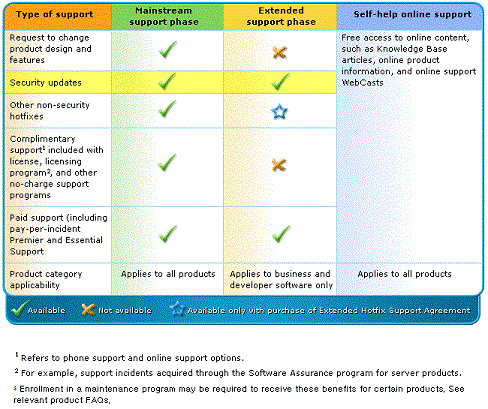Microsoft adapts product support lifecycle -- 'to the cloud!'
I've always thought that one of the keys to Microsoft's success in business computing is its support lifecycle policy. When you buy a Microsoft product for your business you can count on a long period of support and bug fixes and an even longer period of security updates. Now Microsoft is adapting its support lifecycle policy to the cloud.
Click here to read Microsoft's main page on its support lifecycle. I'm running Windows 7 64-bit on a ThinkPad. The OS shipped October 22, 2009 and "mainstream support" ends January 15, 2015. After that (for business products) there are 5 years of "extended support" in which free (well, no such thing, let's say included with the software price) Microsoft support ends (other than security updates), and you can't request feature changes anymore. But you can at least buy all other support options. After 10 years, usually the "in the wilderness" phase of support starts, but at least Microsoft keeps support info on its web site. This is the phase into which, for example, Windows 2000 recently entered.
In fact, if you ask me, in some cases the support lifecycle has gone too far. From the standpoint of wanting to improve the security of "the Windows ecosystem," Microsoft's decision to extend support for Windows XP to 2014 was counterproductive. As I said, typically this level of support runs out after about 10 years. Companies should be moving away from XP with all due speed. Not to digress too far on this; the real point I'm trying to make is that Microsoft has always been liberal about support periods, and this has helped it.
Imagine, by contrast, that you're considering buying Macs for your business. Apple provides support for the current and previous OS X versions. Support for 10.5 (Leopard), which shipped October 26, 2007, will end with the release of 10.7 (Lion), which will ship later this year. It's probably fair to say that generational upgrades of OS X aren't the life-changing event that moving from XP to Vista or Windows 7 is, but it's not nothing. IT has to test apps and configurations and develop a plan for rollout. You can't take your time upgrading the way Windows shops do.

But as Microsoft says in their ads, "To The Cloud!"
I'm a Google Apps customer myself and I've experienced the scary/exciting moment of cloud computing from the customer standpoint: You start up your apps one morning and things are different. Wasn't that button over there before? Where'd the View menu go? And the cosmetic changes are the small stuff. Who knows what's changed in the internal behavior?
The big new concept in online support lifecycle is "disruptive change." Certain changes in software will be lableled as disruptive changes and trigger a set of rules including a minimum of 12 months of prior notice before implementation.
What is a disruptive change? "Disruptive change broadly refers to changes that require significant action whether in the form of administrator intervention, substantial changes to the user experience, data migration or required updates to client software." An example Microsoft provides is a required update to Outlook in order for it to work properly with Exchange Hosted Services.
Speaking of Outlook and other non-cloud apps, such applications sometimes communicate -- one might actually say integrate -- with cloud apps. The Outlook-hosted Exchange pairing is the most common and obvious example, but the number of potential pairings is large and the potential complexity great. Microsoft is clear that even if PC software changes are mandated by cloud changes, they don't affect the standard mainstream/extended support scheme for "on-premesis software."
And the new policies don't apply to security updates. Such updates need to be implemented quickly and, since Microsoft owns the implementation, will be.
There are two other cloud lifecycle policies Microsoft announced: The company will provide a minimum of 12 months prior notification before ending an online service for business and developer customers. Also Microsoft will retain customer data for a minimum of 30 days to facilitate customer migrations, renewal activities or the deprovisioning of the Online Service.
I imagine that private clouds are a different matter. I'll have to check into that.
Click here for Microsoft's Online Services Support Lifecycle Policy.
 Larry Seltzer is a freelance writer and consultant, dealing mostly with security matters. He has written recently for Infoworld, eWEEK, Dr. Dobb's Journal, and is a Contibuting Editor at PC Magazine and author of their Security Watch blog. He has also written for Symantec Authentication (formerly VeriSign) and Lumension's Intelligent Whitelisting site.
Larry Seltzer is a freelance writer and consultant, dealing mostly with security matters. He has written recently for Infoworld, eWEEK, Dr. Dobb's Journal, and is a Contibuting Editor at PC Magazine and author of their Security Watch blog. He has also written for Symantec Authentication (formerly VeriSign) and Lumension's Intelligent Whitelisting site.